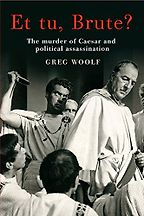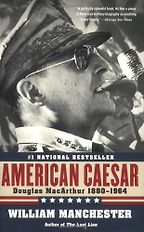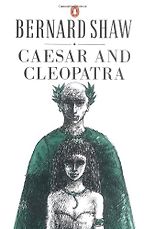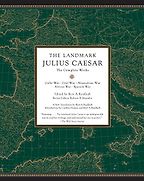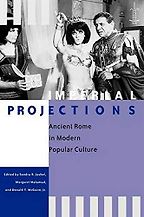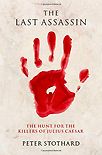Perhaps, before we discuss your selection of books about Julius Caesar, you might briefly outline who Caesar was. As a non-Classicist, I think he conquered Gaul and Britain, and brought the Roman Republic to an end by crossing the Rubicon. He was then assassinated and said: ‘Et tu, Brute?’
Yes, he did conquer Gaul—between 58 and 50 BC—killing maybe a million Gauls in the process, also getting too rich and too powerful for traditional Roman politics to cope with him. No, he didn’t conquer Britain—even though his skill as a self-propagandist has often led people to think that he did. He had two goes at invading Britain, 55 and 54 BC, and was knocked back both times—more by the weather than the Britons.
And yes, he did cross the Rubicon, which was a shallow stream between Gaul and Italy. By crossing it with his army, in January 49 BC, he broke the rules designed to keep victorious armies away from Rome, began a civil war and gave the world a new term for an act from which you couldn’t go back.
Four years later, he might have said something like, ‘Et tu Brute,’ when he saw that one of his assassins on the Ides of March was the much loved son of his mistress. But, if he did, it would have probably been in Greek. It was quite usual for educated Romans to speak Greek. More importantly, he was a great writer in plain and elegant Latin. With words he established his place in the minds of his fellow Romans and of millions of people later by saying what he’d done—just as his death defined him for other writers.
By being assassinated he set a standard for thinking about the motives and consequences of assassination. For Romans, how you died was a very important summation of how you had lived. His death cemented what he’d written about what he had done. And the consequences of his death meant that no one ever forgot him.
Your book, The Last Assassin, deals with the pursuit of Julius Caesar’s assassins by his supporters, most notably his adopted son, Octavian, who would go on to become Emperor Augustus. What does that campaign to get back at his assassins tell us about the early establishment of his myth and reputation?
Caesar had many friends, as people who get to the top always do. But it turned out that some of those friends, for various reasons, were also his greatest enemies, so much so that they were prepared to kill him.
They each had slightly different motives, some of which are related to aspects of Caesar’s own character. Some hated him because they hadn’t become as rich under his watch as they felt he’d promised them they would be, or they’d hoped to be. One of them didn’t like him because he’d slept with his wife. Some didn’t like him because he pardoned them and made them feel, by his famous clemency, that somehow he was holding that over them. They felt ashamed of having been pardoned.
Others killed him because they were jealous of other people who hadn’t been as close to Caesar in the hard days in Gaul, but who seemed to have done almost as well as they had. There were lots of different personal reasons. One of them was upset that Caesar had stolen some lions he had planned to put in a circus show.
“For Romans, how you died was a very important summation of how you had lived”
But they all had this fear that Caesar, even if he wasn’t yet a tyrant in 44 BC, was going to become a tyrant and a single autocratic ruler of Rome. There had been brief periods in Roman history when there had been single autocratic rulers before, but the assassins had this idea that he was going to be different. They couldn’t know that, of course, but they thought he would become a kind of hereditary monarch and impose a different kind of tyranny that they wouldn’t be able to get rid of.
So, they argued amongst themselves, probably suppressing their personal motivations, as to whether it was the right thing to kill a man like Caesar, who had done a great deal for Rome, but who was now on the brink, or over the brink, of establishing a tyranny. Sophisticated arguments were brought to bear about whether they should kill him, or whether the civil war that would probably follow from his death would be even worse.
So, there were these discussions about the evil consequences of tyranny versus a civil war. That discussion was conducted at quite a high philosophical level, but was brought together with a whole lot of those personal motivations for killing him. The philosophical arguments and the individual personal motivations taken together address the issue of who Caesar was.
Let’s move on to the books you’re recommending about Julius Caesar. First up is Et Tu, Brute?: the Murder of Caesar and Political Assassination by Greg Woolf. Tell us about why you’ve chosen this one.
Having to choose five books about Julius Caesar has been a great challenge. Caesar is someone whom you have to look at through many different lenses and prisms. He is not an easy character to see straight up. Looking at him might be compared to looking at the sun. He wasn’t the sun, except to some of his most extreme admirers. But if you try to look at him from one sole direction, it is rather blinding. So, the books I’ve chosen—and Greg Woolf is a very good introduction to this—try to look around Julius Caesar, to look at the ways different people saw him at the time and have seen him since. Woolf’s is a good account of how Caesar got to the Ides of March and what happened on the day. It’s quick and short and a very good start. But there’s also a long section on how the assassination reverberated through history, across Europe and across the Atlantic.
If he didn’t say ‘Et Tu, Brute?’ what did he say?
‘Et tu, Brute?’ was one of Shakespeare’s many contributions. If he said something like it, it is more likely he said the Greek words, ‘kai su, teknon’, which means ‘and you, my child’ and has been variously interpreted to mean ‘even you, who I’ve loved so much’ and ‘even you, the son of my mistress’ or ‘you, too, are going to be assassinated in your turn.’ Maybe it meant ‘I’ll see you in hell’ or a version of ‘up yours, Brutus.’ The Greek phrase has been interpreted in many different ways and Shakespeare’s ‘Et Tu, Brute?’ was just a convenient way of Shakespeare saying what a Roman might have said.
And just before we get on to the next book: we all know how Caesar died, but where did he come from? Was he born into a senatorial Roman family or did he pull himself up by his bootstraps?
He was born into a good family. All the people we’re talking about in the story, all Caesar’s assassins, were part of the elite, if you like, although the man that I have recently become most interested in, Cassius Parmensis, the last surviving assassin, wasn’t one of the top ones, which in some ways made his eyes a good lens through which to watch the action.
Caesar was a member of one of the elite families which had been rivals, squabbled and cooperated with each other, and fought against each other for hundreds of years, and had made Rome the extraordinary conqueror of so much. Gradually, it turned out that the bigger Rome’s empire, and the bigger the army its generals had, the more impossible it was to control them from the centre. So, Caesar, out in Gaul, with a lot of legions, was a lot more powerful than the Senate, which was supposed to be his master. So the system risked toppling over under its own weight.
“Caesar had many friends…But it turned out that some of those friends, for various reasons, were also his greatest enemies”
But there were still people who thought they could prop it up, that the problem was not the system but Caesar himself. These people were also within the elite—not among the people or the army, who largely loved Caesar, as the assassins found to their cost. These killers thought that, if they could just get rid of Caesar, they could go back to divvying up power in Rome between themselves, as they’d always done.
Let’s move on to American Caesar: Douglas MacArthur 1880-1964 by William Manchester. This is the life of the American general Douglas MacArthur, who was the ruler of occupied Japan after the Second World War. Why have you chosen this book?
This book is a great example of how long the idea of Caesar lived in the minds of people writing about soldiers and politicians. MacArthur was an extraordinary figure. He prided himself on his superiority to everybody else, to his speed and imagination. He didn’t like trench warfare or anything that was slow. He prized the unexpected. He was an egomaniac—not for nothing claimed by Donald Trump as his favourite general—and often cited by people who want to fight the establishment, who want to argue that the establishment is always plodding and slow and wants to do things the way it’s always done them.
Get the weekly Five Books newsletter
Donald Trump liked to compare himself to Douglas MacArthur just as MacArthur’s biographer liked the comparison to Julius Caesar. They were people who did things differently, who subverted the ideas of the elite to really work for the people. This is a continuous strand of thought since the death of Caesar—and the background to a big bit of Donald Trump’s mind.
And did MacArthur himself consciously model himself on Caesar?
Yes, he did, in many different respects. Caesar’s writings were designed to make him a hero back home, even when fighting a long way away. And MacArthur in the Pacific Islands was a master of making sure that everybody back home knew what he was doing and who was setting the big policies. He was never in retreat—only ‘advancing in another direction’, a very Julius Caesar-like thought. When MacArthur said, ‘the most important rules are the ones you break’, he was also echoing Caesar. He ruled postwar Japan like a Caesar. Eventually the American president at the time, Harry Truman, got fed up with this, decided that he was risking a war with China over Korea and, in April 1951, ordered him home.
Did MacArthur have any political ambitions? Did he end up in the Senate, or anything like that?
He made a lot of fuss for a long time, stamping up and down the country. He made a fortune speaking. And it was a long time before he gave up the idea that he might have political ambitions of his own. He was an egomaniac. He did have political ambitions, but he was thwarted. He died just a very short few months after the assassination of President Kennedy. One of his great lines was that old soldiers never die, they just fade away. Douglas MacArthur, once President Truman had sacked him, did fade away—until Donald Trump brought the American Caesar back. That might have been the Roman Caesar’s fate, too, but because he was assassinated, a certain idea of Caesar was propelled thousands of years ahead.
Let’s move on to George Bernard Shaw’s play, Caesar and Cleopatra. Tell us a bit about the play and why Shaw was drawn to this particular story. What’s the spin he puts on it?
Shaw had a very high view of himself and compared himself constantly to Shakespeare. He thought that, in respect of the handling of power, Shakespeare had got the Romans wrong. His idea was that Shakespeare was very good at dealing with failure and romance, but not very good at dealing with the great hero.
Shaw paints a portrait of Caesar in which his motivations, those that romantic biographers and filmmakers like to show as being all about love, were actually formed by hard-nosed, brutal political calculations and realities. Shaw was making comments, in a sense, on the British occupation of Egypt, which had started in 1882, and relating it to the Roman occupation. He took the hardest-nosed, de-romanticised view of that part of Caesar’s life—in contrast to the view put up by so many storywriters, balladeers and Shakespeare.
Shaw was very interested in Nietzsche and he thought that Caesar was an example of ‘the New Man’ who would solve the problems of the old world. He saw Pompey, whom Caesar had defeated after his crossing of the Rubicon, as part of the old world that had to be pushed aside.
Shaw was writing at a time a time when many people were keen to dismiss the old and corrupt and find new superheroes. He thought that Caesar was a great man who had not been able to find a vehicle to show his greatness.
And is it a good play, or a good read? Is it put on regularly still?
It’s fun and gritty and it was a huge hit on Broadway in its day. It would probably now be considered a bit old-fashioned, but Shaw is a great playwright to read. He always wrote long introductions to his plays explaining what the play was all about. You know what Shaw was trying to say about Julius Caesar, even if the performance doesn’t quite say it.
Let’s move on to the next of your books, The Complete Commentaries of Julius Caesar. There’s probably not much need for an explanation as to why you’ve chosen them, but tell us a bit about them and also a bit about why Caesar wrote them—it’s quite unusual for a general to be a great literary figure.
He had the talent and he had extraordinary stamina. He had people who helped him, secretaries and copiers. Some of his adjutants were effectively people helping him with his writing. One of the things they all said about him was that he had this gift for what we might now call multi-tasking. He could dictate six or seven letters, write a speech and watch where the enemy was going all at the same time. This was probably massively exaggerated but, clearly, then as now, some people are much better at that than others.
It sounds a bit like Churchill.
Exactly. And I think if you’ve got that skill and other people don’t, it’s useful to play it up because it does make you seem somewhat superhuman, even if actually you’re doing something that lots of ordinary people can do as well. We all know people who can only concentrate on one thing and people who can do four or five things at once. If one of those skills is elegant, clear writing, that is a rare and very useful gift.
“‘Et tu, Brute?’ was one of Shakespeare’s many contributions.”
One of the reasons why Caesar’s Gallic Wars became a set text for generations and generations of British, German, French and American schoolboys was not just because it showed a hero in his own voice—if you thought of Caesar as a hero—but it also had this extraordinarily disciplined, economical and beautiful use of language. He was an extraordinary writer and I don’t think Five Books on Julius Caesar would be complete without the Complete Works.
These include the famous Gallic Wars but also books for the period covered by Shaw’s play, the so-called Alexandrian War, the time when he was fighting to get Cleopatra established in Egypt. This one was probably written by admirers of Caesar, the so-called ‘continuators’, who fought with him in Gaul and other war zones and who finished the books off after he died. And you really can tell the difference in style between the books that Caesar wrote himself and the rest. The continuators keep the character of Caesar going but are unable to match Caesar’s Latin.
Were they written for the record or did they serve a political purpose?
The Commentaries absolutely served a political purpose, which is one of the reasons why they’re so clear and focused. He was fighting away from Rome for years and years at a time. But he still needed the support of the Romans and so he wanted them to know what he was doing, just like MacArthur, following him, did.
So the Commentaries on every year of the war in Gaul found their way, pretty deliberately, back to Rome and they were copied and people talked about them and said, ‘Isn’t Caesar doing fantastically well?’ And that’s where the assassins really got it so wrong, because the people knew that Caesar was doing all these great things, the soldiers knew that he was doing these great things. By modern standards, he was a genocidal egomaniac but on their terms he was doing very well by Rome.
Five Books interviews are expensive to produce. If you're enjoying this interview, please support us by donating a small amount.
That view was much advanced by the image of Caesar that Caesar had created himself. The Commentaries were a very important part of projecting that image, as it were over the top of the Senate, to the Roman people. Again, it’s that kind of language you get from Trump and other populists: you can bypass the elite and somehow get your message straight to the ordinary people.
Although we don’t know a lot about the publication of Caesar’s work, it is pretty clear that people in Rome had a very good idea of what he had achieved and these Commentaries were his way of making sure they did.
So, the Commentaries were a first-century BC version of Twitter, effectively.
To some extent. But they were more extensive and connected than that. They were more like newsreels, really. They were long and described every battle, or rather every battle he wanted you to know about. Any battle that he lost or nearly lost could be deemed not a battle at all and quietly edited out. But he was judicious. Not everything went well for him. When it came to Britain he wrote an account of his two attempts to conquer Britain, both of which were failures. He found reasons to explain that. He didn’t pretend that everything was absolutely wonderful which, of course, probably in itself improved the credibility of what he did say.
And do you get any sense from reading his Commentaries of what he was like as a private individual, beyond the carefully curated public figure?
No, there is no sense of what he was doing at night. That would have been unusual. I don’t think that meant that Caesar was particularly secretive. It’s just not the particular style of that particular book, any more than Douglas MacArthur, when he was relaying his exploits back home, would have told you about the mistress in his hotel bedroom. You do get an impression of someone who was swift, decisive, successful and brutal when he had to be. His writings also stress strongly his capacity for clemency, a virtue that was very important to Caesar but also would shame and irritate some of those who became his assassins.
Let’s move on to “Infamy! Infamy! They’ve All Got It in for Me!”, which is an essay by Nicholas Cull in Imperial Projections in Modern Popular Culture.
Yes. It’s a good part of a very good book. Carry on Cleo, one of the most popular of the Carry On films, is another important way of looking at Julius Caesar. The people who made the films would have probably laughed at the idea that they were a socio-political text, but Nicholas Cull is right to present them in that way. The plot of Carry On Cleo is a mishmash of the stories of Caesar and Cleopatra, Antony and Cleopatra, plus a bit about the invasion of Britain all mixed into one. It is quite a good reminder that a lot of the history we read, which all seems so clear-cut, might be just as much of a mash-up. But it’s also a sort of triple satire—on Caesar himself, on the British Empire (which by the 1960s was fading fast) and, perhaps most importantly, a satire on the new American hegemony. The whole film is based on the set of the great Richard Burton/Elizabeth Taylor Cleopatra film.
Get the weekly Five Books newsletter
The Carry On producers said they could make a whole film about Cleopatra in the time that it would take Joseph Mankiewicz and his team to paint one wall of a set. Carry On Cleo was done on the cheap, very quickly, and had a wonderful script. And it has the amazing line of the assassination where Kenneth Williams, as a very camp Julius Caesar, comes storming out of a door with a dagger in his back and a lot of angry assassins behind him, and shouts, ‘Infamy! Infamy! They’ve all got it in for me!’ Many fans of British comedy in the postwar period say that the line was never bettered anywhere.
Five Books aims to keep its book recommendations and interviews up to date. If you are the interviewee and would like to update your choice of books (or even just what you say about them) please email us at [email protected]
